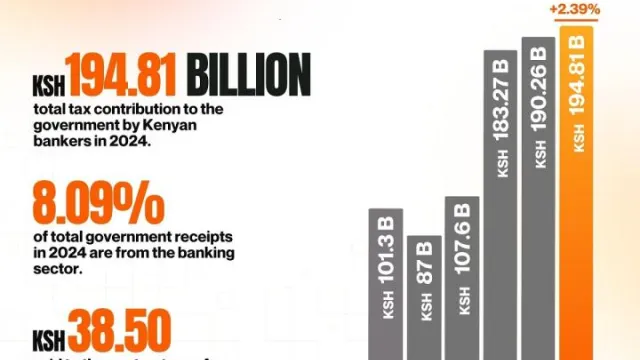Banks paid Sh195 billion in taxes to the Treasury in 2024

For every KES100 of profit made by the participating banks in Kenya, KES38.50 was paid to the government as taxes, a measure known as the Total Tax Rate (TTR)
The Kenya Banking sector paid a total of KES194.81 billion in taxes to the National Treasury in the year ended 31 December 2024, a new report shows.
According to the Total Tax Contribution of the Kenya Banking Sector – 2024 the Total Tax Contribution (TTC) from 36 participating banks and microfinance institutions represented 8.09 percent of all government tax receipts for the period.
This share of contribution highlights significant reliance on a small pool of highly compliant taxpayers within the economy.
‘’The KES194.81 billion TTC comprised KES100.12 billion in taxes borne, direct costs to the banks such as Corporate Tax, and KES94.69 billion in taxes collected on behalf of the government, such as Pay As You Earn (PAYE) and Withholding Tax,’’ the report prepared by the the Kenya Bankers Association (KBA), in collaboration with PwC Kenya reveals.
A notable trend from the report is the shifting nature of the tax burden. While corporate tax remained the single largest component at KES69.41 billion (35.63 percent of TTC), it declined by 4.98 percent compared to 2023.
This was partly offset by a significant rise in people-related taxes, driven by the full-year implementation of the affordable housing levy (AHL), which saw collections from the banking sector more than double, surging by 113 percent to KES3.45 billion.
Notably, the report finds that for every KES100 of profit made by the participating banks, KES38.50 was paid to the government as taxes, a measure known as the Total Tax Rate (TTR). The trend represents a decrease from 46.77 percent in 2023, primarily driven by an increase in bank profitability.
“The KES194.81 billion tax contribution by 36 participating banks in 2024 highlights the sector’s central role in Kenya’s revenue mobilization. This data provides valuable insights for policymakers as they consider how to balance fiscal sustainability with sector resilience. The banks’ voluntary participation also reflects a strong commitment to transparency and responsible governance,” said KBA Chief Executive Officer, Raimond Molenje.
“This 8.09 percent contribution from just 36 taxpayers underscores the banking sector's important role in Kenya’s tax revenues and highlights the continued reliance on a few highly compliant taxpayers. This data informs the essential dialogue around tax policy needed to ensure the sector remains robust,” said Peter Ngahu, PwC Country and Regional Senior Partner, Eastern Africa.
The report further examines how banks distribute value to their key stakeholders. In 2024, the government received the largest portion at 54.95 percent via taxes, followed by employees at 25.62 percent through salaries and benefits, and shareholders at 19.44 percent through dividends.
The report notes that banks incur significant administrative costs, with an average of three full-time employees dedicated to tax-related tasks, costing about KES13.5 million per bank each year. Participants suggested reducing this burden by returning to monthly Withholding Tax filings and increasing automation using platforms such as iTax and eTIMS.





